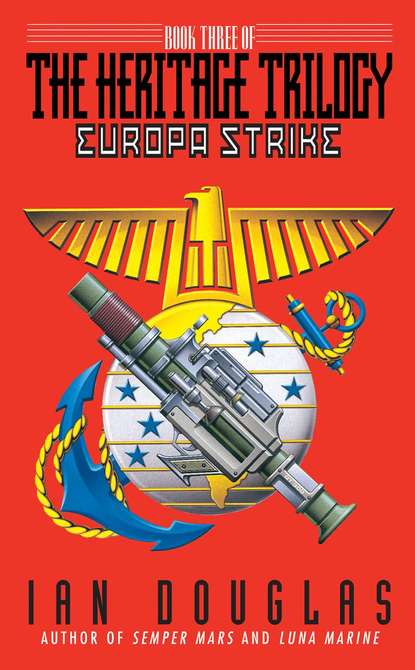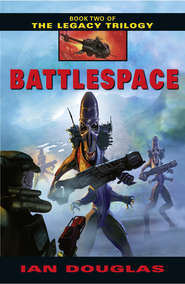По всем вопросам обращайтесь на: info@litportal.ru
(©) 2003-2025.
✖
Europa Strike
Настройки чтения
Размер шрифта
Высота строк
Поля
All those Marine ancestors. And he got sick in small boats.
He didn’t suffer long, however. Carver guided the DSV into Neried’s wetbay, a wide, low-roofed cavern that closed off astern of them once they entered. A docking crew on the walkways to either side jumped aboard and secured lines to her retractable deck cleats. Her wings folded up, like the wings of an aircraft aboard a Navy strike carrier, as the working party hauled her by hand into a berth nestled alongside three identical craft.
Carver released her dorsal hatch, and a few moments later, Jeff was clambering up the ramp, onto the brow, and out into the relatively open space of the subcarrier’s wet-bay.
Captain Matheson, Neried’s CO, and Marine Colonel Haworth were waiting for the three as they stepped onto the walkway. “Permission to come on board,” Mark said.
“Granted, granted,” Matheson replied, grinning. “How’d it go?”
“Well, except for our unauthorized intruder, fine,” Mark said. “That’s quite a boat you people have there.”
“Come on up to the plot room,” Haworth said. “We’ll talk. The general will be here in a few minutes.” He glanced at Jeff. “What’s the matter, Warhurst? You’re looking a mite green.”
The lighting in the wetbay was poor enough that the colonel couldn’t possibly have noticed the color of Jeff’s skin, so the comment had to be a joke. It hit near enough the mark, however, that Jeff suppressed a wince. “Squared away and shipshape, sir.”
“I’m relieved to hear it.”
In fact, the large ship, with her broad, outrigger construction, was remarkably steady even in rough seas, so he no longer felt the pronounced roll of the ocean’s swell. By the time he’d followed the other officers up a level to the O1 deck and forward to the plot room, he was feeling somewhat better. A crushed ice machine in the wardroom along the way provided him with something cold and wet to hold in his mouth and thin his rising gorge.
General Altman arrived less than ten minutes later. They watched the approach of his UV-20 Condor on one of the plot room’s PLAT cam monitors as it swung in over Neried’s landing pad, hovered a moment on furiously howling tilt-jets, then lowered itself to a gentle touchdown. Altman and three members of his staff disembarked from the craft and were led below through a deck hatch, as a team of sailors rolled the aircraft forward into the upper deck hangar, one of the few above-deck structures on the carrier.
“I don’t know whether to be honored or terrified,” Jeff observed. “Generals don’t usually give briefings. And they sure as hell don’t fly out to meet you. They make you come to them.”
“Altman’s a decent guy,” Mark said. “He’s a rifleman.”
Jeff chuckled. In the Corps, it was said that every Marine—whether recruit or general, computer maven or tank driver or pilot or cook—was an infantryman, a rifleman, first. As with all aphorisms, there was some truth in the saying—as well as some wishful thinking. The every-Marine-a-rifleman concept sounded fine, but as with any large organization, the idealism tended to be lost after a while within the accretions of bureaucracy and daily routine.
But the saying was a popular one, and high praise indeed for a general.
“It is possible,” General Altman told them, an hour later, “that Icebreaker has been compromised. Two days ago, the Chinese government formally filed a protest with our embassy in Beijing, demanding that we stop all attempts to recover ET artifacts on or in Europa, pending the arrival of a PRC transport.”
Altman was a big, bluff man, a twenty-eight-year veteran of the Corps who’d won the Silver Star at Vladivostok and the Navy Cross and Purple Heart in the Cuban Incursion in ’50. An African American, he rejected all labels or political euphemisms as they applied to race; if the subject ever came up, he referred to himself only as a “dark-green Marine.” He had a reputation for bluntness—and for being willing to talk to his men and hear their gripes.
They were seated around an electronic table in the plot room, using the big, flat-screen computer monitor on one bulkhead to display graphics. One of the general’s aides had used his PAD to link into the room’s computer and put up a blurry vid-image of a spacecraft, obviously shot at extremely long range. It was a typical A-M drive ship design, a long, central spine with multiple reaction mass tanks, a heavily shielded drive unit aft with enormous heat radiator fins, a complex arrangement of slowly turning spin-gravity modules forward for the crew. Smaller craft, dwarfed by their huge consort, drifted in her shadow.
“Reconnaissance drones and tracking satellites have been keeping an eye on their two A-M drive ships in geosynch,” Altman went on. “The Xing Feng and the Xing Shan. They appear to be making preparations to get under way. In the past two weeks, cargo and manned launches from Xichang have gone from one a week to one or two a day. They also appear to be loading supplies aboard the research vessel Tiantan Shandian. Everything seems to indicate the Chinese are taking a much stronger interest in their political and military presence in space. Coupled with their ultimatum yesterday, their activities in space are taking on something of a sinister connotation.”
Jeff looked up from his own PAD, where he’d been studying the Chinese ship in detail. “Question, sir?”
“Go ahead, Major.”
“Why would Beijing be so hot about space now? They’re still recovering from their war.”
And it had been a nasty war, at that. Greater China had split into North and South after their civil war earlier in the century, with Tibet going her own and independent way. North China had fought on the European side during the UN War, mostly in the hope of settling old claims to parts of Siberia and Russia’s East Maritime Provinces, while Canton had sat the war out as a watchful neutral. Stopped cold at Vladivostok, she’d refused to sign the Treaty of London, but she’d also pulled her forces back behind the Amur. Within fifteen years, North China had invaded the south. The fighting had been vicious and fratricidal, including chemical and biological weaponry, though no nukes, thank God. The war had lasted twelve years and cost an estimated one and a quarter billion lives and uncounted trillions of yuan in damage. Since most of the fighting had been fought with Maoist guerrilla tactics, there’d been relatively few major battles in all that time, but vast parts of the South, especially, had been completely wrecked, and several major cities, including both Shanghai and the South China capital of Kuangchou, were now uninhabitable ruins.
General Altman considered Jeff’s question for a moment. “A good question, son. There are two answers, really. The first is that a fight with outsiders will make the job of politically unifying the country easier. The people are always willing to tighten their belts and endure privation if they’re faced with an outsiders-versus-us crisis.”
“Ah, xenophobia,” Mark said from his side of the table. “The glue that binds us together…against ‘them.’”
“The second is more critical to Beijing’s leaders, though,” Altman went on. “They’re afraid we’re going to grab all the juicy e-tech for ourselves.”
E-tech, originally “ET-tech” or “altech,” was the term now applied to the new technologies flowing to Earth from the alien ruins on Mars and the Moon. New materials, new manufacturing processes, a hint that nanotechnology might be possible after all, the possibility of new power sources…the practical benefits were only just beginning to emerge from the xenoarcheological digs.
“So…just like the UN War,” Jeff said. He glanced at Mark. That fighting, precipitated by a UN attempt to stop the United States and Russia from opening the ancient alien ruins on Mars, had led directly to Garroway’s March and the Battle of Cydonia.
“In simplistic terms, yes,” Altman’s senior aide, a lieutenant colonel named Montoya, said. “What we’ve found on Europa might well prove to be the key to all of the other ET discoveries we’ve made. Something is down there beneath the ice and still operating, possibly after half a million years. It may help us make sense out of everything we’ve learned—about ancient humans living on Mars, the An enslavement, the Hunters of the Dawn, all of it. And the promise of new technologies, my God! Most of what we’ve been able to recover so far have been bits and pieces and scraps. Some of the stuff from the underground complex in Cydonia is still operating, of course, but we haven’t figured out how to read the Builders’ records yet. And the An base we found at Tsiolkovsky is still almost a complete mystery. It’s going to take decades, maybe centuries, to learn the languages well enough to know what we’re looking at. Unless, of course, the Singer can give us some clues.”
“The Chinese are facing their own version of the GenevaReport,” Altman added. “Like us, they’re counting on technology to hold the Long Night at bay long enough to get their feet under them. E-tech might give them a shortcut, might even solve all their problems, if they can crack the language and engineering problems.”
The UN had used the Geneva Report’s infamous computer projections to justify their attempt to bring the U.S. and Russia to heel in ’40…and to grab the Martian e-tech. The report had predicted a complete breakdown of civilization by the year 2050 if all of the world’s nearly 10 billion people were not immediately brought under a single, unified system for distributing food energy and the world’s limited resources.
There were those who pointed out that the Geneva Report had, in fact, come true. The wholesale slaughter in China over the past twelve years might be just the proverbial beginning of the end.
The United States and her closest allies, Russia and Japan, had been counting on new materials processing, new industries, whole new technologies from the xenoarcheological digs to render the Geneva Report moot. It might still happen…if civilization could be held together just a little longer.
“The damnable part of it is,” Mark said, “they’re not doing anything to help themselves by trying to stop us on Europa. Dog in the manger, you know?”
“Maybe they don’t like depending on us and the Japanese for handouts,” Jeff suggested.
“It probably does come down to a question of control,” Altman said. “The military regime in Beijing has been on shaky ground ever since the end of communism and their Second Civil War. They can’t afford to let the people have unrestricted access to the new technologies, not without risking falling out of power. They need to be seen as the saviors of China, and they need to control how fast the e-tech comes in—which is probably a lot faster than we’ve been able to provide it ourselves. The IES doesn’t like releasing their findings prematurely.”
The Institute for Exoarchaeological Studies—the foundation in New Chicago coordinating e-tech research—was notorious for its cautious advance into unknown territory ranging from advanced materials processing to nanotechnology to faster-than-light communications.
Considering the fact that many of the e-tech findings were of a scope and power guaranteed to utterly transform all of human civilization into something quite new, Jeff had always felt that that caution was more than justified. No one had any idea what lay around the corner in the near future; there were bound to be surprises, and some of them might be unpleasant ones.
“Regardless of the political pros and cons,” Altman continued, “our interests on Europa must be protected. If the Chinese are planning on intervening there, it’s up to us to stop them. Washington is cutting the orders now. One-MSEF’s deployment has been moved up by five weeks. The Roosevelt will boost on September 29. And you will be ready.”
Jeff looked up, startled. “Sir, that’s two weeks!”
“Do you have a problem with that, Marine?”
“The scheduled boost was in seven weeks. The men are still in their training cycle—”
“They should be ready to go, anytime, anywhere. That’s what the Corps is all about.”
Jeff wanted to say that training and equipping a Marine Space Expeditionary Force to the frozen wastes of Europa was a bit different from hitting the beach in Borneo or Iran or Cuba or any other LZ on Earth. Instead, he said, “Aye, aye, sir.”
“They should be familiarized with the Mark II armor by now.”
“Yes, sir. They won’t have time for training with it on the Moon, though.”
“You’ll have to hope that Earthside practice is enough. We’re going to want to start shuttling them up to the Franklin D. Roosevelt as soon as possible.”
Practice on Earth, with one G and a full atmosphere of pressure, could not possibly replace training with the new suits in vacuum and Luna’s one sixth G. Again, though, he knew better than to argue. Marines learned how to carry on. Improvise! Adapt! Overcome! No matter what.
“You’ve had a chance to evaluate the Manta.”
“Today was my first day, General. It looks like a beautiful craft. I don’t know yet how well it’ll serve as a transport on Europa.”











